Guinea pigs are herbivores that require a varied diet to meet their nutritional needs. As such, many pet owners wonder if parsley is a safe and healthy option for their furry companions. In this section, we’ll explore whether guinea pigs can consume parsley, the nutritional benefits of this herb, and how to safely introduce it into their diet.
Key Takeaways
- Guinea pigs are herbivores that require a variety of fresh foods to meet their nutritional needs.
- Parsley is safe and beneficial for guinea pigs in moderation.
- When introducing parsley into their diet, start small and monitor your guinea pig’s health and digestion.
- Other safe herbs and greens can be offered as alternatives or in addition to parsley for variety.
- Observing your guinea pig’s health and seeking veterinary advice when necessary is crucial for their well-being.
Guinea Pig Dietary Needs
Guinea pigs have unique dietary requirements that differ from other pets. Their digestive system needs a diet rich in hay, fresh vegetables, and fruits. Unlike humans, they cannot produce their own vitamin C, making it crucial for them to get sufficient amounts from their food. Other necessary nutrients include fiber, protein, and calcium.
Hay should constitute the majority of a guinea pig’s diet, making up at least 80% of their food intake. Fresh vegetables and fruits should make up the remainder of their diet, with a focus on leafy greens like kale, romaine lettuce, and parsley. It’s crucial to offer a variety of fresh foods to ensure they get the necessary nutrients.
Feeding your guinea pig a balanced and nutritious diet is crucial for their overall health and well-being. Lack of proper nutrients can cause several health issues, including dental problems, digestive issues, and even blindness.
Check with your vet to ensure your guinea pig’s diet meets their specific needs, and monitor their weight and health regularly. A healthy and well-fed guinea pig is a happy and active pet.
The Importance of Fresh Foods
Fresh foods are essential to ensure the overall well-being of your guinea pig. Variety is key when it comes to feeding your furry friend, as each fresh ingredient provides unique benefits. Incorporating different herbs, greens, and vegetables into your guinea pig’s diet will not only keep them interested in their food but also provide necessary nutrients.
Be sure to choose high-quality fresh ingredients, free from pesticides, and wash them thoroughly before feeding. A balanced diet should include fresh foods high in vitamin C, such as bell peppers and leafy greens, as guinea pigs cannot produce vitamin C on their own. Including fresh hay as a source of fiber is also important for their digestive health.
Overall, feeding your guinea pig fresh foods is crucial to maintaining a healthy and happy pet. Make sure to introduce new foods gradually to avoid any digestive upset.
Introducing Parsley into a Guinea Pig’s Diet
Guinea pigs can safely consume parsley as part of their diet, and many enjoy the taste of the herb. However, it’s essential to introduce parsley gradually and in moderation, as sudden changes to their diet can cause digestive issues.
Start by offering a small amount of parsley, about a teaspoon, once or twice a week. Monitor your guinea pig’s reaction and appetite for the herb, gradually increasing the amount over time if they tolerate it well.
It’s also crucial to ensure that the parsley is thoroughly washed and free from any harmful substances. Avoid feeding wilted, spoiled, or pesticide-laden parsley to your guinea pig.
Remember that while parsley is a nutritious addition to their diet, it should not make up the majority of their food intake. Offer a variety of other fresh vegetables, hay, and commercial guinea pig food for a well-rounded diet.

Nutritional Benefits of Parsley for Guinea Pigs
Parsley not only adds flavor and color to your guinea pig’s diet but also provides several essential nutrients that can benefit their health. This herb is a good source of vitamin C, an essential nutrient that guinea pigs need to prevent scurvy. Additionally, parsley contains vitamin K, which plays a crucial role in blood clotting and bone health.
Moreover, parsley is packed with various minerals such as calcium, potassium, and iron, which can help maintain strong bones, muscle function, and healthy blood volume. These minerals also aid in supporting a healthy immune system, which is essential for guinea pigs to ward off infections and illnesses.
Overall, incorporating parsley into your guinea pig’s diet can offer several nutritional benefits and improve their overall well-being. However, as with any new food introduced into their diet, it’s essential to monitor their reaction and digestion and consult a veterinarian if necessary.
Risks and Considerations of Feeding Parsley to Guinea Pigs
Feeding parsley to your guinea pig can be beneficial, but like any food, it’s essential to keep certain risks and considerations in mind. While parsley is safe for most guinea pigs, excessive consumption can cause potential health issues.
One of the primary risks of overfeeding parsley is its high oxalate content. Oxalates can interfere with the absorption of calcium, leading to bladder and kidney stones. Additionally, parsley is rich in vitamin C, and while guinea pigs need a diet rich in vitamin C, excessive amounts can cause diarrhea.
When incorporating parsley into your guinea pig’s diet, start small and gradual. Monitor your pet closely for any adverse reactions, such as diarrhea or bloating. Avoid feeding your guinea pig wilted or spoiled parsley, as it can cause digestive issues.
It’s also important to balance parsley with other fresh ingredients and ensure your guinea pig’s overall diet meets their nutritional needs. Providing proper nutrition helps keep your pet healthy and reduces the risk of developing health issues due to a lack of nutrients.
Quantity and Frequency of Parsley Intake
While parsley can offer nutritional benefits to guinea pigs, it’s important to strike a balance, so they receive it in safe amounts and at regular intervals. Introducing it gradually into their diet is the best approach.
Parsley Quantity
The recommended amount of parsley to feed your guinea pig is a tiny sprig twice a week. This small portion is enough to provide them with the nutrients without overwhelming their digestive system.
Feeding them large amounts of parsley can lead to digestive issues such as diarrhea, bloating, and gas, which are unpleasant for your pets. Therefore, sticking to small portions is vital for their health and well-being.
Parsley Frequency
Offering parsley twice a week is sufficient as any less, and they may not get the complete benefits, while any more can be detrimental and lead to related health issues.
However, feeding parsley should not be the only fresh ingredient they receive. Guinea pigs require a balanced diet rich in variety that includes fresh fruits, vegetables, hay, and quality pellets. This way, their nutritional needs are met, and they maintain a healthy lifestyle.
The key takeaway is to offer small portions of parsley twice a week and supplement it with a variety of other fresh foods to meet your guinea pig’s dietary needs.
Preparing Parsley for Guinea Pigs
When giving parsley to your guinea pig, it’s important to prepare it correctly. If consumed in its natural state, parsley may contain harmful bacteria or pesticides that can harm your pet’s health. Follow these simple steps to ensure your parsley is safe for your guinea pig:
- Thoroughly wash the parsley under running water to remove any dirt or debris.
- Cut the parsley into small, bite-sized pieces to prevent choking.
- Remove any hard stems or seeds that could cause digestive issues.
Once prepared, serve the parsley in moderation, alongside a variety of other fresh fruits and veggies in your guinea pig’s diet.
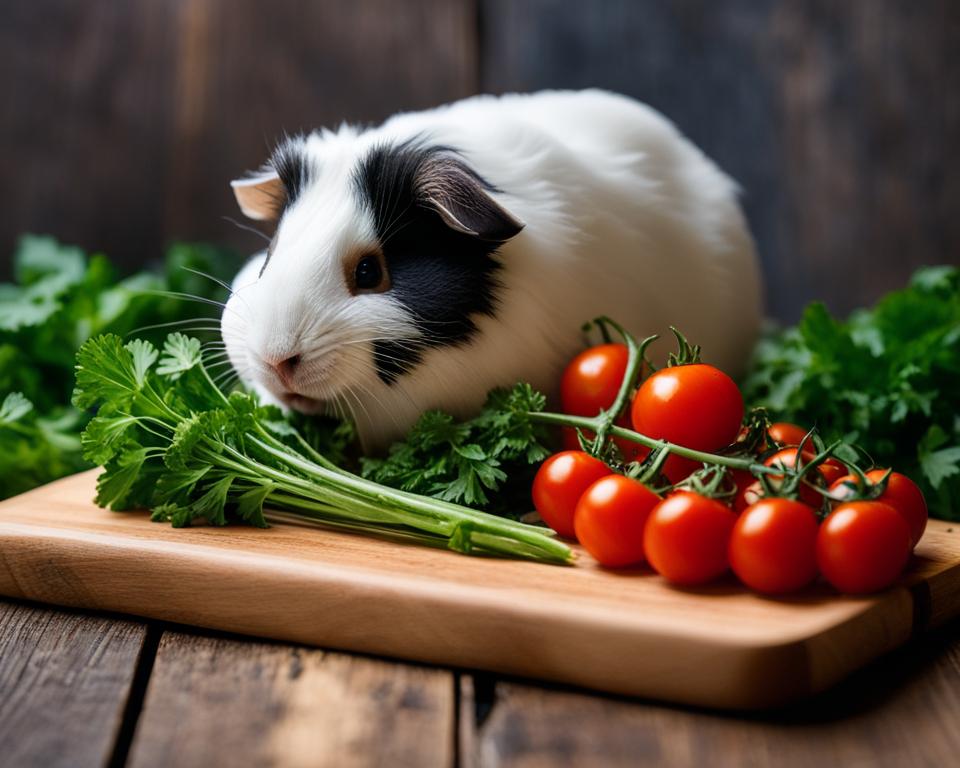
Parsley Alternatives for Guinea Pigs
If you’re looking to add some variety to your guinea pig’s diet or if parsley isn’t readily available, there are plenty of other safe options when it comes to herbs and greens. Some great parsley alternatives include:
- Cilantro: Similar in taste to parsley, cilantro is packed with vitamins and minerals that can benefit your guinea pig’s health.
- Basil: Not only is basil safe for guinea pigs, but it also contains antioxidants that can help prevent disease and keep them healthy.
- Mint: Mint is another great option that can aid in digestion and provide some necessary vitamins and minerals.
- Arugula: This leafy green is a great source of calcium, vitamin C, and vitamin K. Just be sure to introduce it gradually, as it can cause gas if eaten in excess.
- Romaine Lettuce: While iceberg lettuce should be avoided due to its low nutritional value, romaine lettuce is a safe and healthy option that provides important vitamins and minerals.
Monitoring Your Guinea Pig’s Health and Digestion
When introducing parsley or any new food to your guinea pig’s diet, it’s crucial to monitor their health and digestion closely to ensure they’re responding well. Some common signs to watch for include:
- Decreased appetite or thirst
- Weight loss or gain
- Inactivity or lethargy
- Diarrhea or constipation
- Bloated stomach or gas
- Changes in urine or stool appearance
If you notice any of these symptoms, it’s essential to seek veterinary advice promptly. Your vet can examine your guinea pig and recommend any necessary changes to their diet or treatment if needed.
Regularly monitoring your guinea pig’s health can help you catch any potential issues early and keep them happy and healthy.
Conclusion
In conclusion, guinea pigs can eat parsley as part of their diet. However, it’s crucial to introduce it gradually and monitor their health and digestion closely. Parsley offers many nutritional benefits and can be an excellent addition to a guinea pig’s diet, but it should not be the sole source of essential nutrients.
Remember to balance fresh foods, hay, pellets, and water to meet your guinea pig’s dietary needs adequately. If you have any concerns about your guinea pig’s health or digestion, seek veterinary advice immediately.
By following the guidelines outlined in this article, you can safely incorporate parsley into your guinea pig’s diet and provide them with a varied and balanced diet to promote their overall well-being.
FAQ
Can guinea pigs eat parsley?
Yes, guinea pigs can eat parsley. It is safe and healthy for them to consume in moderation.
What are the nutritional facts about parsley?
Parsley is rich in vitamin C, vitamin K, iron, and fiber. It also contains antioxidants that can help boost a guinea pig’s immune system.
How should parsley be introduced into a guinea pig’s diet?
It is important to introduce parsley gradually into a guinea pig’s diet to avoid digestive upset. Start with small amounts and gradually increase the serving size over time.
What are the nutritional benefits of parsley for guinea pigs?
Parsley provides essential vitamins and minerals that can support a guinea pig’s overall health and well-being. It can help improve their immune system and promote healthy digestion.
Are there any risks or considerations when feeding parsley to guinea pigs?
While parsley is generally safe for guinea pigs, it should be given in moderation. Too much parsley can cause digestive problems or urinary issues due to its high calcium content.
How much parsley should I feed my guinea pig and how often?
It is recommended to offer a small handful of parsley leaves once or twice a week as a treat. This quantity ensures they receive the nutritional benefits without overdoing it.
How should parsley be prepared for guinea pigs?
Wash the parsley thoroughly to remove any dirt or pesticides. Remove the stems and offer the leaves only, as the stems can be tough for guinea pigs to chew.
Are there any parsley alternatives for guinea pigs?
If you are unable to provide parsley or want to add variety to their diet, safe alternatives include cilantro, dill, basil, and mint. Ensure that any alternative herbs or greens are safe for guinea pigs before offering them.
How should I monitor my guinea pig’s health and digestion when feeding them parsley?
Observe your guinea pig for any signs of digestive issues or changes in behavior after introducing parsley. If you notice any problems, consult a veterinarian for guidance.

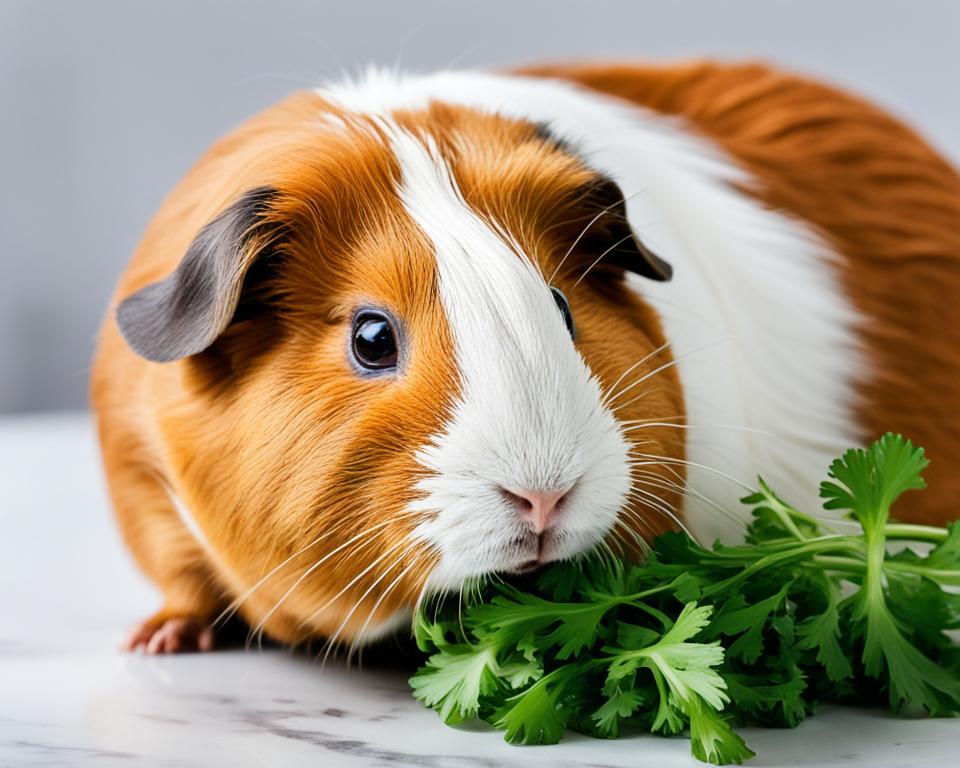
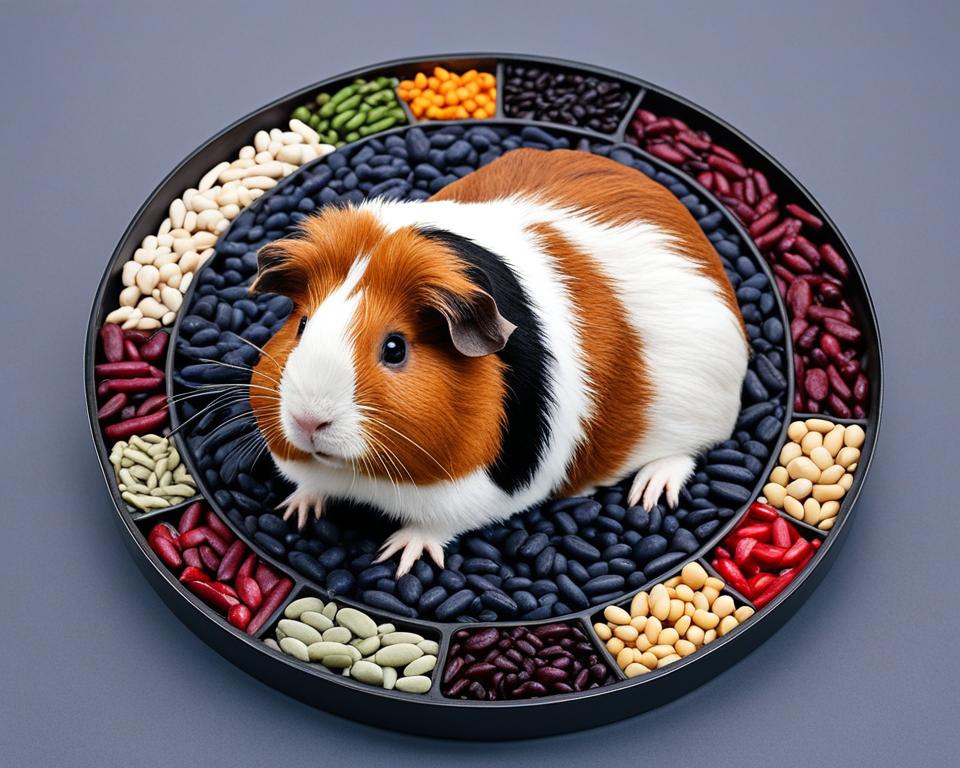
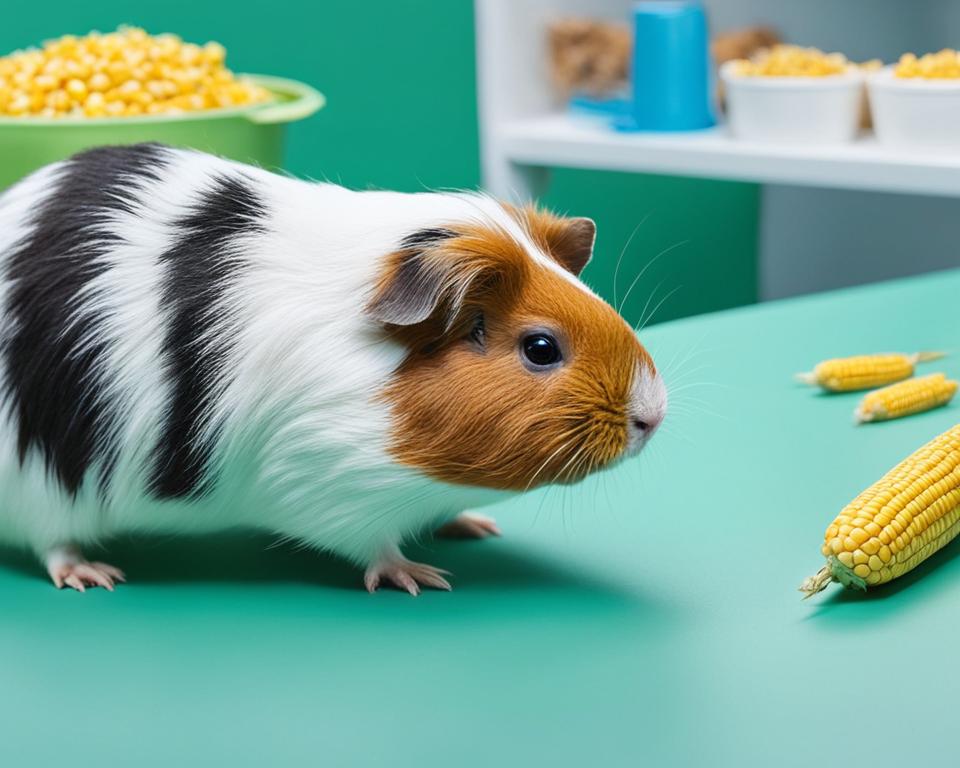
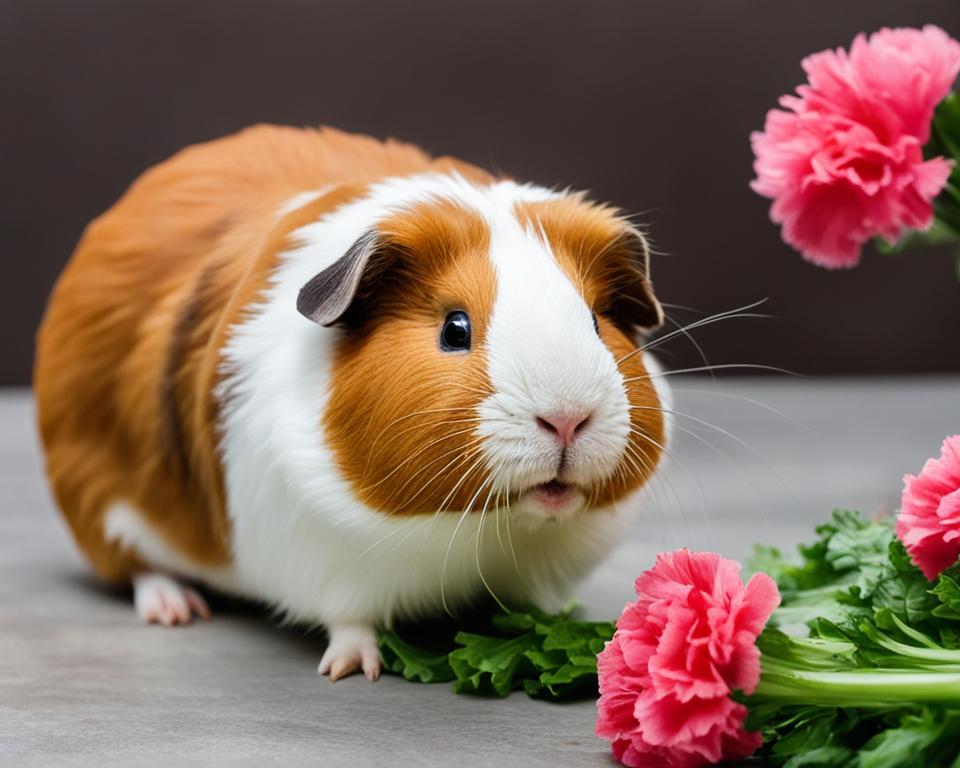
Leave a Reply